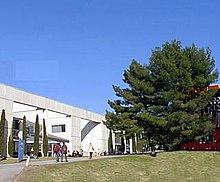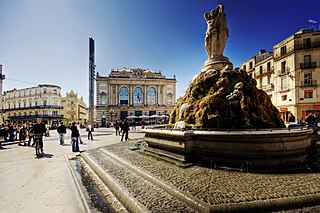
Montpellier is a city in southern France near the Mediterranean Sea. One of the largest urban centres in the region of Occitania, Montpellier is the prefecture of the department of Hérault. At the 2020 census, 299,096 people lived in the city proper, while its metropolitan area had a population of 813,272. The inhabitants are called Montpelliérains.

Languedoc-Roussillon is a former administrative region of France. On 1 January 2016, it joined with the region of Midi-Pyrénées to become Occitania. It comprised five departments, and bordered the other French regions of Provence-Alpes-Côte d'Azur, Rhône-Alpes, Auvergne, Midi-Pyrénées towards the north, and Spain, Andorra and the Mediterranean Sea towards the south. It was the southernmost region of mainland France.

The Université de Sherbrooke is a French-language public research university in Sherbrooke, Quebec, Canada, with a second campus in Longueuil, a suburb on the South Shore of Montreal. It is one of two universities in the Estrie region of Quebec, and the only French-language university for the region.
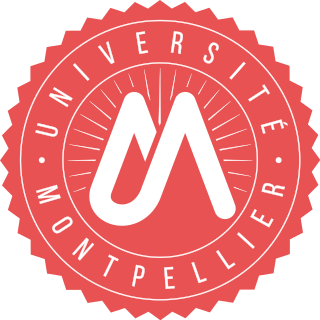
The University of Montpellier is a public research university located in Montpellier, in south-east of France. Established in 1220, the University of Montpellier is one of the oldest universities in the world.

Université Sainte-Anne is a French-language university in Pointe-de-l'Église, Nova Scotia, Canada. It and the Université de Moncton in New Brunswick are the only French-language universities in the Maritime Provinces.

The University of Ouagadougou is a university located in Ouagadougou, Burkina Faso. Founded in 1974, it was officially renamed in 2015 as l’Université Ouaga 1 Professeur Ki-Zerbo. The UO consists of seven Training and Research Units (UFR) and one institute. In 1995 a second campus for professional education known as the University Polytechnique of Bobo (UPB) was opened in the city of Bobo Dioulasso A third campus for teacher training/trainers opened in Koudougou in 1996; in 2005, it became the University of Koudougou.
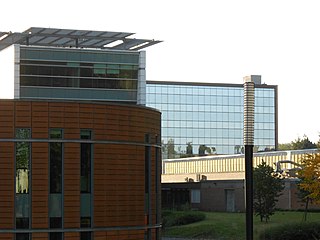
The Lille 1 University of Science and Technology was a French university located on a dedicated main campus in Villeneuve d'Ascq, near Lille, with 20,000 full-time students plus 14,500 students in continuing education (2004). 1,310 permanent faculty members plus 1,200 staff and around 140 CNRS researchers work there in the different University Lille 1 institutes and 43 research labs. University Lille 1 was a member of the European Doctoral College Lille Nord de France, which produces 400 doctorate dissertations every year. The university is ranked in the world top 200 universities in mathematics by the Shanghai ranking.

Paris 1 Panthéon-Sorbonne University, also known as Paris 1 and Panthéon-Sorbonne University, is a public research university in Paris, France.
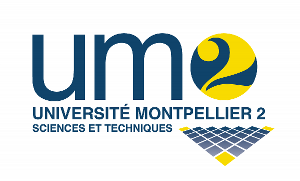
Montpellier 2 University was a French university in the académie of Montpellier. It was one of the three universities formed in 1970 from the original University of Montpellier. Its main campus neighbors the Montpellier 3 University's main campus, and for this reason the nearest tramway station is named "Universities of Sciences and Literature" rather than "University of Sciences". In January 2015, Montpellier 1 University and Montpellier 2 University merged into the Montpellier University.
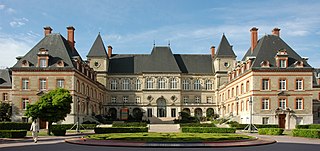
Cité internationale universitaire de Paris or the Cité universitaire is a university campus, a private park and foundation located in Paris, France. Since 1925, it has provided general and public services, including the maintenance of several dozen residences housing around 6,000 students and visiting academics in the Île-de-France region. Officially recognized as a foundation of public interest, the CIUP promotes exchanges between students from around the world in a spirit of tolerance.

The National Union of Students of France is the largest national students' union in France. It is historically close to the Socialist Party, with many of its member joining the party after leaving student life.

Le Mans University is a public university in western France with campuses in Le Mans and Laval.

The University of Nîmes, also known as Unîmes, is a French university, in the Academy of Montpellier. It was founded on 7 May 2007 as the successor to the Nîmes University Center for Training and Research, which already bore the short name Unîmes. As of 2023, it had 5,687 students enrolled.

University of Versailles Saint-Quentin-en-Yvelines is a French public university created in 1991, located in the department of Yvelines and, since 2002, in Hauts-de-Seine. It is a constituent university of the federal Paris-Saclay University.
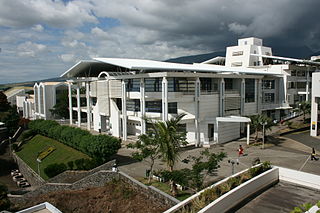
The University of Reunion Island is a French university in the Academy of Réunion. It is the first and only European university in the Indian Ocean. Established in 1982, it has grown steadily over the years in terms of student population, geographical sites occupied, courses offered and partnerships forged with local, national, and international institutions. The school's ambition is to be the reference university in Indianoceania.

Rennes 2 University is a public university located in Upper Brittany, France. It is one of the four universities of the Academy of Rennes. The main campus is situated in the northwest of Rennes in the Villejean neighborhood, not far from the other campus, at La Harpe.
The Association pour une solidarité syndicale étudiante (ASSÉ) was a Canadian student union founded in February 2001 in Sherbrooke, Quebec, which contained about 56,000 CEGEP and university-level students in 34 member student unions throughout Quebec. The ASSÉ positioned itself distinctly from the other province-wide student unions, the Fédération étudiante universitaire du Québec (FEUQ), the Fédération étudiante collégiale du Québec (FECQ) and the Table de concertation étudiante du Québec (TaCEQ), namely rejecting hierarchical leadership structures in favor of autonomous and horizontal approaches.

Chloé Jacquet is a French rugby union player. She plays rugby union for her home town Lyon in France where she also attends university.

Anne Fraïsse is a French Latinist and academic. She is a professor of Latin patristics at the Paul Valéry University Montpellier (UPVM). She served two terms as president of the UPVM, from 2008 to 2016, and was re-elected in 2020. She was also vice-president of the France Universités from December 2010 to December 2012.

